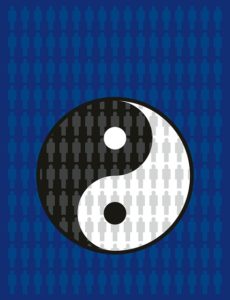 T’ai Chi theory teaches we have capacity beyond what is commonly believed. We are capable of a higher level of achievement. Boundaries or rails on higher achievement come from restrictions or barriers we place on our capability “One reaches the ultimate level, or develops in that direction, by means of the ladder of balanced powers and their natural motions-Yin, the negative power (yielding), and Yang, the positive power (action).” Waysun Liao, The Essence of T’ai Chi, (Shambhala 2007) at 6.
T’ai Chi theory teaches we have capacity beyond what is commonly believed. We are capable of a higher level of achievement. Boundaries or rails on higher achievement come from restrictions or barriers we place on our capability “One reaches the ultimate level, or develops in that direction, by means of the ladder of balanced powers and their natural motions-Yin, the negative power (yielding), and Yang, the positive power (action).” Waysun Liao, The Essence of T’ai Chi, (Shambhala 2007) at 6.
Yin and Yang oppose and complement each other. When this natural law of balance is lost so is our ultimate capacity. This can happen when a trial lawyer loses balance (often when the charging Yang dominates the yielding Yin).
All cases cannot be tried, and some cases should be settled. The trial lawyer knows all cases cannot be settled and some cases should not be settled. The key is balance. Balance is knowing when to try a case and knowing when to settle a case.
Balance of Yin and Yang is the key. At the beginning of a case Yang is often in the lead. In dealing with an insurance company this is good as fair case value is achieved when the insurance company knows the lawyer believes in the case and will try the case. The successful trial lawyer never takes a case they do not believe in, as belief is essential for success in trial. When the trial lawyer believes in the case a Yang aura permeates the case. The insurance company takes the case seriously. The Yin aura emerges after the insurance company takes the case seriously. This is when fair value may be paid. This balance of Yin and Yang can lead to a quality settlement,
“The Chinese have long realized the two T’ai Chi elemental powers must interact, and the harmonious result …[brings] progress and unlimited development.” Id. at 8. When we practice personal injury law balancing the two powers of Yin and Yang we benefit our client and our law practice.
Post Footer automatically generated by Add Post Footer Plugin for wordpress.

